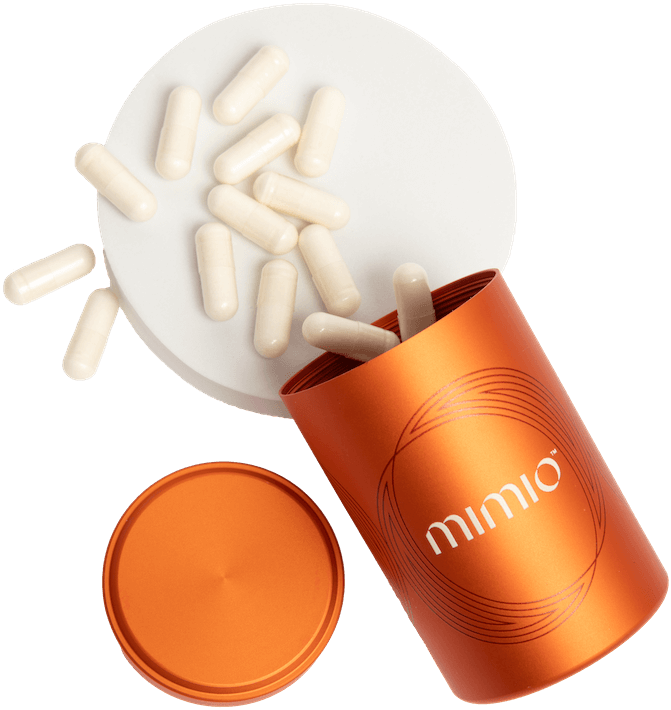The decline in energy that comes with age is one of the most recognizable signs of getting older. Whether it’s fatigue, slower recovery, or decreased cognitive sharpness, much of this can be traced back to one critical cellular component: mitochondria. As the powerhouses of our cells, mitochondria generate the energy we need to function, and when they falter, so does our vitality.
A fascinating area of research has emerged around the idea of mitochondrial transplants, literally moving healthy mitochondria into compromised cells to restore energy production. But can mitochondrial transplants truly reverse age-related decline? And are there natural strategies, such as fasting or biomimetic supplements like Mimio, that offer more practical ways to enhance mitochondrial function?
This article explores the cutting-edge science of mitochondrial transplants, what it means for aging, and how Mimio provides a daily, natural alternative for mitochondrial renewal.
The Role of Mitochondria in Aging
Mitochondria aren’t just energy producers; they are central regulators of cell survival, metabolism, and signaling. With age, however, mitochondria experience several problems:
-
Mitochondrial DNA Damage: Their DNA is highly vulnerable to oxidative stress.¹
-
Declining NAD+ Levels: Essential for energy metabolism, NAD+ declines with age.²
-
Reduced Biogenesis: The ability to generate new mitochondria diminishes.³
-
Increased Dysfunctional Mitochondria: Damaged mitochondria accumulate, producing more reactive oxygen species (ROS) and contributing to inflammation.⁴
This dysfunction leads to age-related energy decline, which include less ATP, more fatigue, and higher susceptibility to chronic disease.
Mitochondrial Transplants: The Science So Far
Mitochondrial transplants involve isolating healthy mitochondria from donor cells and introducing them into damaged or energy-deficient cells. Early experiments show promise:
-
Cardiac Applications: Transplanting mitochondria into damaged heart tissue improved function in animal studies.⁵
-
Neurological Studies: Preliminary research suggests mitochondrial transfer may help neurons recover from injury.⁶
-
Immune System Benefits: Transplanted mitochondria appear to modulate immune responses and reduce inflammation.⁷
While these findings are groundbreaking, mitochondrial transplants are still experimental, with major challenges:
-
Delivery Issues: Ensuring transplanted mitochondria reach the right cells safely.
-
Immune Rejection: Risks of immune responses against donor mitochondria.
-
Ethical & Practical Barriers: Large-scale application in humans is still far from reality.
Aging, Energy Decline, and Fasting Biology
Interestingly, many of the benefits researchers seek from mitochondrial transplants overlap with what happens naturally during fasting. Extended fasting triggers autophagy and mitophagy, which are the recycling and renewal of damaged cellular components, including mitochondria.⁸
This is why fasting is so strongly associated with improved energy, metabolic health, and even longevity. By pushing the body into repair mode, fasting helps clear dysfunctional mitochondria and stimulate the production of healthier ones.
Curious about fasting’s benefits? Explore our guide on the 36-hour fast.
Mimio: A Natural Alternative to Mitochondrial Transplants
Mimio was created to mimic the effects of a 36 hour fast, activating the same regenerative pathways that mitochondrial transplants aim to restore, but in a natural, daily supplement.
Here’s how Mimio supports mitochondrial health:
-
Mitophagy Activation: Mimio encourages the recycling of damaged mitochondria, improving energy efficiency.⁹
-
NAD+ Support: By mimicking fasting metabolism, Mimio helps sustain NAD+ levels, crucial for mitochondrial function.²
-
Inflammation Reduction: Mimio reduces chronic inflammation, which accelerates mitochondrial decline.¹⁰
-
Metabolic Flexibility: Helps the body switch between glucose and fat for fuel, lowering mitochondrial stress.³
Unlike experimental transplants, Mimio is designed for daily use, and therefore makes the biology of fasting accessible without extreme measures.
Take control of your energy: Explore Mimio Biomimetic Cell Care here.
Comparing Approaches: Mitochondrial Transplants vs. Mimio
|
Approach |
Mechanism |
Benefits |
Challenges |
|
Mitochondrial Transplants |
Direct insertion of healthy mitochondria |
Potential restoration of cell energy |
Experimental, delivery & immune rejection risks |
|
Fasting |
Triggers autophagy & mitophagy |
Natural clearance of damaged mitochondria |
Requires strict adherence, difficult for many |
|
Mimio |
Biomimics 36-hour fasting metabolome |
Activates fasting pathways daily, boosts mitochondria naturally |
Safe, accessible supplement |
This comparison highlights how Mimio offers a practical, natural alternative that leverages the same biological principles without the risks of transplant procedures.
The Future of Mitochondrial Therapies
The idea of transplanting mitochondria remains one of the most intriguing frontiers in regenerative medicine. In the future, it may play a role in treating heart disease, neurodegeneration, or immune disorders. But for healthy individuals seeking to maintain energy and slow aging, focusing on mitochondrial resilience through natural methods is currently the most practical strategy.
Biomimetic supplements like Mimio allow us to tap into these same pathways safely and effectively, bridging the gap between cutting-edge science and daily wellness.
Reversing Energy Decline Naturally
Mitochondrial transplants may one day provide powerful therapies for specific conditions, but they are still experimental and face significant hurdles. In the meantime, natural strategies that include fasting, exercise, nutrient-dense diets, and biomimetic supplementation remain the most effective ways to support mitochondrial function.
Mimio stands out because it captures the regenerative biology of fasting in a simple, daily formula that supports mitochondrial renewal, NAD+ metabolism, and cellular resilience.
For those seeking to combat mitochondrial transplants aging research with practical, science-backed action, Mimio offers a path to sustained energy and longevity today.
Start supporting your cellular powerhouses now: Discover Mimio Biomimetic Cell Care.
References
-
Shokolenko, I. N., et al. (2009). Oxidative stress induces degradation of mitochondrial DNA. Nucleic Acids Research.
-
Verdin, E. (2015). NAD+ in aging, metabolism, and neurodegeneration. Science.
-
Jäger, S., et al. (2007). AMP-activated protein kinase (AMPK) action in skeletal muscle. PNAS.
-
López-Otín, C., et al. (2013). The hallmarks of aging. Cell.
-
McCully, J. D., et al. (2017). Mitochondrial transplantation for therapeutic use. Journal of Thoracic and Cardiovascular Surgery.
-
Chang, J. C., et al. (2016). Mitochondrial transplantation in Parkinson’s disease models. Frontiers in Cell and Developmental Biology.
-
Islam, M. N., et al. (2012). Mitochondrial transfer in immune modulation. Nature Medicine.
-
Longo, V. D., & Panda, S. (2016). Fasting, circadian rhythms, and healthy lifespan. Cell Metabolism.
-
Madeo, F., et al. (2019). Mitophagy and cellular longevity. Nature Reviews Molecular Cell Biology.
-
Franceschi, C., & Campisi, J. (2014). Chronic inflammation (inflammaging) and age-associated diseases. Journals of Gerontology.



